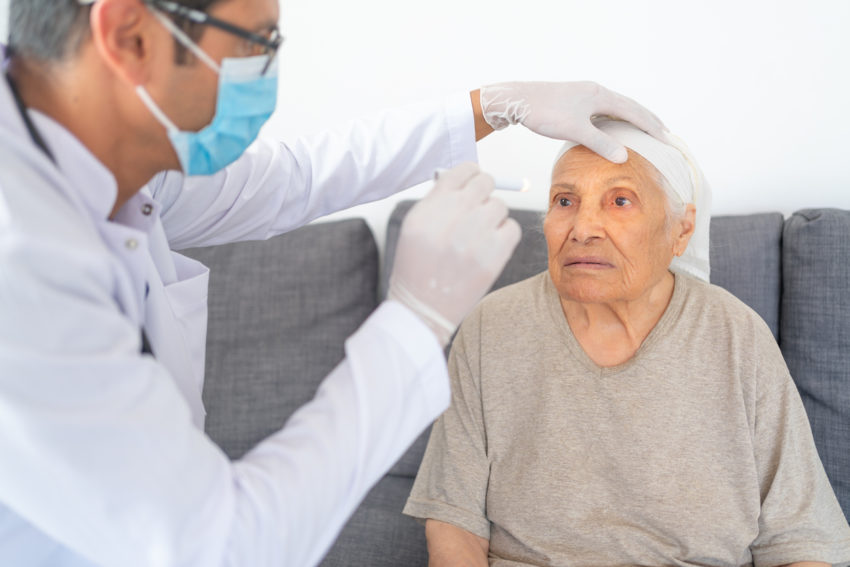
Share On Social!
Latinos at risk of a stroke do not receive adequate treatment and support despite being aware of their risk factors, according to a new study published in Stroke, an American Heart Association journal.
“It’s a wake-up call for the medical community. Despite our best efforts, Hispanic and Latino populations still seem to be undertreated for their vascular risk factors,” said Dr. Fernando D. Testai, co-author of the study, according to McKnight’s Long-Term Care News. “I didn’t expect the numbers to be so dismal.”
Researchers suspect that lack of access to healthcare and not having health insurance are the main contributors to Latinos being undertreated for strokes, indicating that inequitable resources can have a detrimental impact on Latino health.
What Did the Stroke Study Find?
The Stroke study analyzed patient data of 404 Latino participants who were Cuban, Dominican, Mexican, Puerto Rican and Central and South American living in major cities with large Latino populations, like Chicago, New York City, Miami, and San Diego.
The participants all had a stroke or mini-stroke (transient ischemic attack).
Most participants were aware of their risks for further cardiovascular problems, but hadn’t taken steps to control them.
“Yet even among those who knew their risks, only about half had blood pressure under control, one-third had healthy cholesterol numbers and half kept blood sugar levels in the healthy range,” according to the American Heart Association News.
Additionally, only half of participants were taking anti-clotting medication and less than half were taking cholesterol-lowering statin drugs, some of the main stroke prevention medications.
Many participants also had other risk factors, like weight and smoking habits.

“Almost 80% of people in this study were overweight or obese, and a significant number continued to smoke despite having a history of stroke and other cardiovascular events,” Testai said, according to the American Heart Association News.
Researchers blamed the disparities on lack of healthcare access and health insurance.
Unfortunately, lack of access to healthcare and insurance is common for Latinos.
“At least 27% of Latinos currently report having no usual health care provider. The percentage of Latinos with no health care coverage dropped from 26.2% to 15.1% from 2013 to 2016 under the Affordable Care Act (ACA); but it remains much higher than the percent drop among uninsured non-Latino whites from 14.1% to 6.6% in that same span,” according to a Salud America! research review.
The key to reducing these disparities is for doctors to encourage healthy behaviors, they said.
“Healthcare providers can help change the numbers by informing and supporting Hispanic/Latino adults to adopt healthy lifestyle behaviors in order to reduce their cardiovascular risk,” according to McKnight’s Long-Term Care News.
How at Risk are Latinos for Stroke?
Unfortunately, Latinos are at high risk for cardiovascular issues like strokes.
“According to AHA statistics, an estimated 52% of Hispanic men and 43% of Hispanic women have heart disease. Half of Hispanic men and 41% of Hispanic women have high blood pressure; about 37% of both men and women have high cholesterol; and 48% of men and 32% of women have higher-than-normal blood glucose levels, though not yet high enough for a diabetes diagnosis,” according to the American Heart Association News.
These factors all increase the risk of a stroke.
Another risk factor is obesity, which Latinos are more affected by.
“Latino adults have higher obesity rates than their white peers (47% and 37.9%), as do Latino children (20.7% and 11.7%),” according to Salud America!.
We can help address these disparities by advocating for healthy lifestyles for Latinos.
How Can We Improve Healthy Lifestyles among Latinos?
Advocating for healthier lifestyles is part of the key to reducing disparities and lessening health risks like strokes for Latinos.
Another part is increasing access to healthcare and insurance.
You can help advocate for more access to healthcare by downloading the Health Equity Report Card.
The report card allows you to see what access your community has to healthcare, food, education, and other resources. You can help advocate for your neighbors and present the Health Equity Report Card to your city’s leadership!
GET YOUR HEALTH EQUITY REPORT CARD!
Explore More:
Healthcare AccessBy The Numbers
25.1
percent
of Latinos remain without health insurance coverage



